“I am not just doing hip-hop, I AM hip-hop and I cannot tolerate wackness”
The average New Yorker sees upwards of fifty pieces of graffiti a day. But they never stop to think about the stories behind those pieces. This is one of those stories.
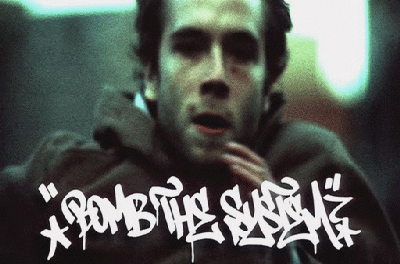
Having resided in the UK for the duration of my young life, I have yet to make my first journey across the pond to sample the world that Jean Baudrillard described as being ‘completely rotten with wealth, power, senility, indifference, Puritanism and mental hygiene, poverty and waste, technological futility and aimless violence’. I am, of course, referring to George Dubya’s good ol’ You-Ess-of-A. However, as a self-proclaimed hip-hop aficionado, I am familiar with the four pillars of hip-hop as perpetually propounded by the blast-master KRS-One: DJing, MCing, B-Boying and, of course, Graffiti.
So, it was with baited breath that I sat down to watch Adam Bhala Lough’s dramatic foray into New York’s burgeoning graffiti scene, Bomb the System, which is apparently the first feature length film in over twenty years to focus on the subject of graffiti (word to Wild Style).

It also cost less to make than it costs to buy an average-sized property in one of the many rundown areas of London ($500K/£250K). The movie was first screened at various film festivals in 2002 and later hit American theatres in 2005. As far as I am aware, Bomb the System has not been screened in the UK, but for at some smaller art house theatres that advertise their showings only by carrier pigeon or telekinesis. No matter, for as well as being familiar with the four pillars of hip-hop, I am also familiar with BitTorrent and managed to find a DVD rip of the film online. Ah, the wonders of the interweb.
useless fact #4
Shortly after Bomb the System’s limited theatrical release in the United States, a cinema in Delaware was closed down and both the police and bomb squad were called to attend the cinema. The reason? Because the manager found a sticker saying ‘Bomb the System’ in the cinema. Cultural misunderstanding or not, some people should really be executed at birth.
Graffiti: the only art form that can be considered a crime
It is widely documented that graffiti emerged in the 1970s in New York City and quickly made the transition from ‘vandalism’ to ‘street art’, perhaps primarily due to the sheer volume of pieces that appeared around the city. In the 1980s, graffiti went some way to being semi-legalized and even crossed over into the lofty realm of ‘high culture’ thanks to its inclusion in the works of artists such as Jean-Michel Basquiat. It seemed, for a fleeting moment, that graffiti would finally be recognised as a bona fide art form and not merely a form of nuisance championed by the great unwashed. However, such recognition was quickly curtailed as graffiti was reigned in and sent back underground by Rudi ‘little Hitler’ Giuliani and his straight-out-of-a-Batman-comic-named ‘NYPD Vandal Squad’ in the 1990s. Accordingly, despite its interesting and varied history, graffiti has not been given much of a cinematic makeover over the years.
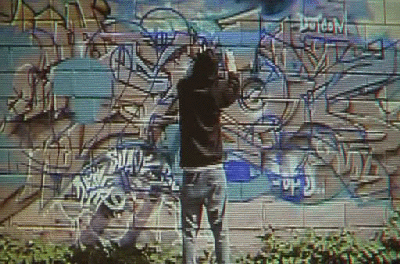
To this end, Rolling Stone called Bomb the System a ‘next-gen update of 1983’s Wild Style’ that has ‘strong whiffs of [Danny Boyle’s] Trainspotting and [Larry Clark’s] Kids’, as well as distinguishing itself with ‘streaky, Krylon-bright editing and El-P’s eerie soundtrack beats’. As an aside, El-P is the bomb (pause) and I have included a link to a version of the score, ripped straight from the DVD no less, at the end of this post (courtesy of CCWM). Village Voice similarly concluded that the movie was birthed from a ‘blunt-fueled blend of Aronofskian frenzy [read: Darren Aronofsky of Requiem for a Dream and Pi fame] and nostalgia for the agreeable griminess of mid-90s Wu-Tang Clan videos’. Which reminds me, does anyone else remember just how good Wu-Tang’s video for Protect Ya Neck was, back in the day?! The New York Times even contributed its two cents by noting that:
the movie runs on the synergy between this grimy but glamorous urban landscape and the emotional intensity of characters, who at moments suggest contemporary descendants of the innocent, tormented teenagers in Rebel Without A Cause.
Any negative comments largely seem to come from out-of-touch conservative (Republican?) reviewers. The New York Post criticized the film for trying to ‘argue that graffiti writers are political artists, not an urban blight’ and Sean Axmaker, in response to the unabashedly positive depiction of graffiti artists in the film, likened the filmmakers to ‘tomcats spraying in their own yard’. Notice the distinct juxtaposition between the intelligent dissections of Rolling Stone et al compared to this twaddle. If in doubt, vote Conservative/Republican, eh?
“Graffiti does not belong in a gallery. It belongs on the streets, where it started from”
In short, Bomb the System follows the misadventures of a group of graffiti artists, living in NYC, who decide to mark their mark on the city’s urban landscape. In the film, Anthony ‘Blest’ Campo, a nineteen year old high school graduate with no ambition, is one of the most notorious (and gifted) artists in NYC. Blest sees the city as his playground and spends his days stealing spray paint from hardware stores and his nights getting high and ‘bombing’ with his crew (which includes Justin ‘Buk 50’ Broady and his younger brother, Kevin ‘Lune’ Broady). Such blatant theft is justified by the fact that ‘real’ graffiti artists apparently steal their tools of the trade, as purchasing them is regarded as a sign of weakness and lack of commitment to the anti-establishment roots of the art form. I will keep that argument in mind next time I am caught boosting from Wal-Mart.
Racking spray paint is the one and only way for a graffiti writer to acquire his tools.
Writers who buy their own cans are considered toys: bitch-made pussies with no heart.
Blest and his crew use graffiti as their primary means of expression, as well as a way of proclaiming their identities. They are motivated solely by the glory of having their work seen and the challenge of circumventing the legal hurdles that they are faced with on a daily basis. Coincidentally, Blest is the most wanted writer on the NYPD Vandal Squad’s hit list, whilst paradoxically featuring as a figure of interest for the local gallery scene.
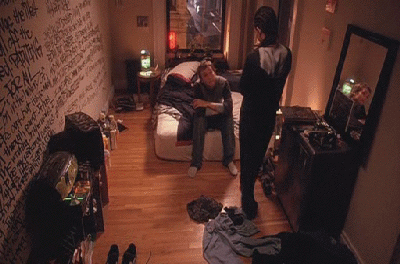
As the narrative progresses, Blest does his best to avoid the police and hostile rival crews. Then, after Lune, a tagger-in-training, is collared by a corrupt cop and physically abused, Blest’s crew declares war on the police by intensifying their bombing excursions. However, Buk 50 becomes increasingly frustrated by Blest’s apparent preoccupation with his (tagger) girlfriend, Alex, and his lack of commitment to their cause.
Somewhat inevitably, a tragedy leads to a predictable, yet cleverly-executed, climactic twist that suggests martyrdom. However, instead of pulling emotive heartstrings, the sequence will likely leave the average viewer left cold and short-changed.
I adore the lighting, darling, but you have truly made a faux pas with the wallpaper
As a strictly sensual experience, Bomb the System tackles graffiti subculture with an edgy, contemporary and stylish perspective. The drama in is primarily provided via a series of jump cuts and El-P’s post-apocalyptic score (as a Def Jukie myself, I was particularly impressed by this). Further, the cinematography and editing bring urban New York to life with the gritty realism that its subject matter not so much necessitates as it does demands. For instance, the opening segment of the film gives the viewer a breakneck tour of a typical day for Blest, Buk 50 and Lune an impressive split-screen sequence and the narrative itself is strung together by Blest’s streetwise and slang-laden narration.

However, as a substantive experience, Lough fails to take advantage of his potentially avant-garde subject matter and further the political and social exploration of graffiti as both an art form and a culture. Instead, he relies heavily on already established genre stereotypes and narrative clichés. At the heart of Bomb the System lies a conventional bildungsroman tale of friendship, anti-establishment struggle and self-discovery. That the life trajectories of Blest and Buk 50, despite sharing a common start, begin to move in opposite directions is hardly an original concept. Whereas Blest struggles to overcome a family grievance and becomes acutely aware that graffiti culture holds no tangible future for him; Buk 50 is so immersed in the culture that he cannot distance himself from it and view his own life through an objective lens. There are no prizes, therefore, for second-guessing Buk 50’s eventual ‘keep it real’/’sell out’ rant later in the film.
If that was not enough, enter the archetypal left-wing girlfriend, Alex, who (true to form) pleads with Blest to direct his skills to something with more substance by incorporating political and anti-corporate messages in his work. Also, that Alex’s work is politically-inclined contrasts sharply with Blest and Buk 50’s mere tagging and undermines their own rationalizations of their need to create art in the form of tags. Indeed, standing beside Alex, their work seems more of an ego trip than an exercise in self-liberation. On the plus side, the actress who plays Alex, Jaclyn DeSantis, is awesome.
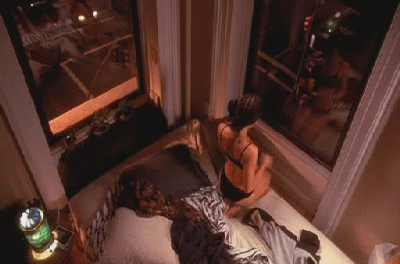
At least Blest’s mother, with her ‘why don’t you go to college and make something of yourself’ stance is wholly originally. I believe that this is the point where Will Smith, in his Fresh Prince of Bel Air guise, would say ‘psyche’.
Run home and cry, emo kid
As a protagonist, Blest is also far from ideal and his self-absorption engenders little sympathy for his plight. He is a white boy from suburban Queens and as such there is a sense is that he is essentially slumming in the Manhattan underworld of gonzo art as a homage to his late older brother, who himself was a legendary tagger (‘Lazaro’) who left his signature tag on the Brooklyn Bridge on the night he died. The point is that Blest can, unlike Buk 50, who is on probation and has to clean toilets as part of his community service, if he chooses, escape. His is a visitor. He is not ‘real’. His resistance to the options that The Man can offer him (a potential art school scholarship) and obliviousness to the needs of his friends does little to endear him to the viewer and sharply undercuts the sense of tragedy that Lough evidently aspires to.
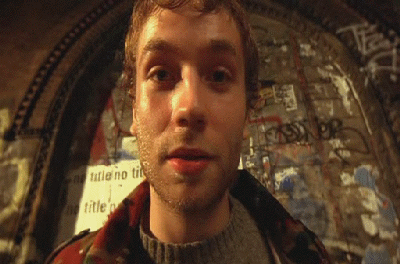
New York: so good they named it twice
Bomb the System is a true New York story. Like the city it depicts, it is a fatally flawed and romanticized microcosm of urban life in modern day American society. Despite this, it (spray) paints an unforgettable portrait of the oft misunderstood art form and culture of graffiti – albeit it in the form of a thinly-veiled thesis on the nobility of graffiti versus conforming and giving in to The Man. Whilst it will do little to convince conservative viewers of the merits of graffiti as anything other than mindless vandalism, Lough offers an honest, heartfelt and impassioned cinematic love poem dedicated to the art and merit of graffiti and to the city that gave birth to the art form more than two decades ago. Rudi Giuliani take note: those who make peaceful revolution impossible, make violent revolution inevitable.

posted by Si at 20:09
- Unknown said:
check out wuforever.com
for latest wu-tang clan single off 8 diagrams, and more wu tang downloads (over 250 songs in mp3)- 24 September 2007 at 19:34







